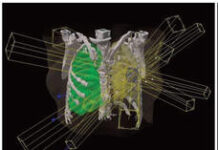Sintilimab, which has been approved in China for the treatment of Hodgkin’s disease, in combination with a bevacizumab biosimilar as first-line treatment of patients with advanced hepatocellular carcinoma (HCC) significantly improved survival compared to sorafenib, according to findings presented at the ESMO Asia Virtual Congress 2020, held 20 to 22 November 2020.
Zhenggang Ren of the Department of Hepatic Oncology, Zhongshan Hospital of Fudan University in Shanghai, China, presented data from the phase III efficacy part of the randomised, open-label, multicentre phase II/III ORIENT-32 (NCT03794440) study evaluating sintilimab plus a bevacizumab biosimilar versus sorafenib as first-line treatment for advanced HCC. The phase II part of the study demonstrated acceptable safety with the combination.
ORIENT-32 enrolled patients with unresectable or metastatic HCC who were naive for systemic HCC treatment. In phase III part, following 2:1 randomisation, 380 patients were treated with sintilimab at 200 mg i.v. every 3 weeks plus a bevacizumab biosimilar at 15 mg/kg i.v. every 3 weeks and 191 patients were treated with oral sorafenib at 400 mg twice daily. Stratification factors included macrovascular invasion and/or extrahepatic metastasis (presence versus absence), baseline alpha fetoprotein level (< 400 versus ≥400 ng/mL) and ECOG performance status (0 versus 1).
The primary endpoints were overall survival (OS) and progression-free survival (PFS) by independent radiographic review committee (IRRC) per RECIST v1.1.
Combination of sintilimab plus bevacizumab biosimilar showed significantly improved survival, thus meeting the study primary endpoints
Among the patients enrolled by data cut-off on 15 August 2020, the baseline characteristics were well balanced; the majority (94.2%) of patients had hepatitis B infection and 4.2% of patients had Child-Pugh B status of chronic liver disease.
With median follow-up of 10.0 months, median OS was significantly longer with the sintilimab plus bevacizumab biosimilar combination than with sorafenib, and the combination setting demonstrated a 43.1% decreased risk of all-cause death; median OS was not estimable (NE) compared to 10.4 months, respectively (hazard ratio [HR] 0.569; 95% confidence interval [CI] 0.431-0.751; p < 0.0001).
Similarly, improved PFS was also demonstrated, with a 43.5% decreased risk of progression assessed by IRRC per RECIST v1.1; median PFS with the combination was 4.6 months compared to 2.8 months with sorafenib (HR 0.565; 95% CI 0.455-0.701, p < 0.0001).
Overall benefit favoured the combination over sorafenib consistently across all the subgroups evaluated.
Efficacy-evaluable patients demonstrated a confirmed objective response rate (ORR; by IRRC per RECIST v1.1) of 20.5% (95% CI 16.5-25.1) with the combination versus 4.1% (95% CI 1.7-8.2) with sorafenib.
Among patients receiving at least one drug dose, any grade treatment related adverse events (TRAEs) occurred in 88.7% of patients receiving the combination versus 93.5% of sorafenib-treated patients. Grade 3/4 TRAEs were reported in 33.7% and 35.7% of patients, respectively.
Conclusions
According to the authors, sintilimab plus a bevacizumab biosimilar showed significant improvements in clinical benefits compared to sorafenib, as first-line treatment of patients with advanced hepatocellular carcinoma.
Funding for this study was reported from Innovent Biologics, Inc.
Reference
LBA2 – Ren Z, Fan J, Xu J, et al. Sintilimab plus bevacizumab biosimilar vs sorafenib as first-line treatment for advanced hepatocellular carcinoma (ORIENT-32). ESMO Asia Virtual Congress 2020 (20-22 November).






